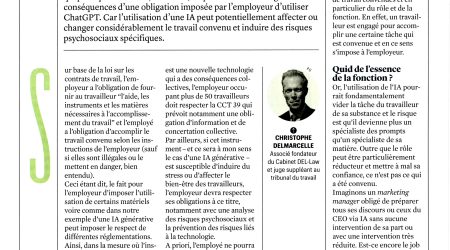Does a filed complaint protect against dismissal?
Posted the 8 March 2012I was bullied at work and fired, even though I had filed a complaint with the police. Because my employer did not know about my complaint, I would have no protection against dismissal. Is this true?
The Act of 4 August 1996 on employee welfare explicitly states that an employee who files a complaint with the police, the public prosecutor's office, or the social inspection enjoys the same protection as one who files a complaint with the prevention adviser.
The law specifies that protection begins "from the moment the complaint is filed." The employer must be notified of the complaint, but this is not a condition for the protection to apply. Courts have confirmed this principle many times.
If someone is dismissed after filing a complaint, it is presumed that the dismissal is related to the complaint, though this presumption can be rebutted. The employer can prove that the dismissal was justified for reasons unrelated to the complaint.
Some argue that if the employer was unaware of the complaint, the dismissal cannot be related to it, and other reasons must be present.
However, the Brussels Labour Court did not support this view in its ruling of 21 September 2011. In this case, the employer was not informed of the complaint. The Court ruled that:
- Protection begins when the complaint is filed;
- The fact that the employer was not notified of the complaint does not suffice to prove that there was no connection with the dismissal. Such a stance would lead to a restrictive interpretation of protection. According to the Court, the employee would only be protected against dismissal as retaliation, which does not align with the actual scope of the legal protection, which prohibits dismissing an employee for the matters raised in the complaint.
The law obliges the entity receiving the complaint to inform the employer that a complaint has been filed and that the person is protected from the moment the complaint is made. If the police, the public prosecutor's office, or the social inspection fails to inform the employer immediately, the Belgian state is responsible.
Related articles

Is an employer allowed to mandate the use of artificial intelligence tools by employees ? (Trends, 17-07-2025)

Caution if a former colleague opposed to your employer asks you to testify in their favor
